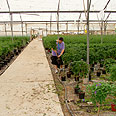

Leading by example: James Wolfensohn, the Quartet’s Special Envoy for Gaza Disengagement and a former president of the World Bank, has been busy lately, trying to solve the touchy problem of what to do with Gush Katif greenhouses once Israeli evacuates the Gaza Strip next week.
Thursday, in order to demonstrate personal commitment to solving the crisis, Wolfensohn put his money where his mouth is, and joined a group of private donors who together will contribute USD 14 million (NIS 63 million) to buy the greenhouses from Israeli farmers and transfer them to Palestinian counterparts.
The cost of Wolfensohn’s personal example: USD 500,000 (NIS 2.26 million).
Getting serious
Sources close to the negotiations said Wolfensohn felt the personal contribution was important.
“In order to enlist other donors, you’ve got to be serious. Investors want to be sure it’s a good cause, and this was a way for him to prove his faith in the project to other people,” they said.
Ynet has learned that private donors will buy the greenhouses, over approximately 3,000 dunams (741 acres), and will transfer them to Palestinian owners.
Good for everybody
The agreement between farmers and private donors was facilitated by the Economic Cooperation Foundation, and will convert the greenhouses used by Gush Katif farmers to grow tomatoes, cherry tomatoes, peppers and herbs to Palestinian property.
The State of Israel is only expected to pay Gush Katif farmers between 50-to-60 percent of the value of the greenhouses.
But under the new agreement, all sides are set to emerge happy: with Foundation grants totalling between USD 3,500 and 4,000 (NIS 15,800 – 18,100), evacuees will receive most of the true value of their greenhouses, and Palestinians will receive infrastructure upon which they can continue a flourishing agriculture sector.
Ensuring continuity
During the next two weeks, the principal challenge will be to ensure the greenhouses are continually tended, in order to prevent crops from dying and to ensure Palestinian farmers can take over functional farms.
Boaz Carni, the treasurer of the Economic Cooperation Foundation, said the Palestinians refused governmental aid to purchase the greenhouses (the reason a previous deal to buy out the Israelis failed – D. B.N.), and said that by finding private donors, Wolfensohn helped solve the problem.
“We were really worried the greenhouses would be destroyed, and that everyone would lose out,” he said. “Now, Israeli farmers will receive fair compensation and Palestinians can continue to develop their economy.
“Almost by accident, we have a situation in which evacuated settlements are helping advance peace. That’s a situation in which everybody wins.”















